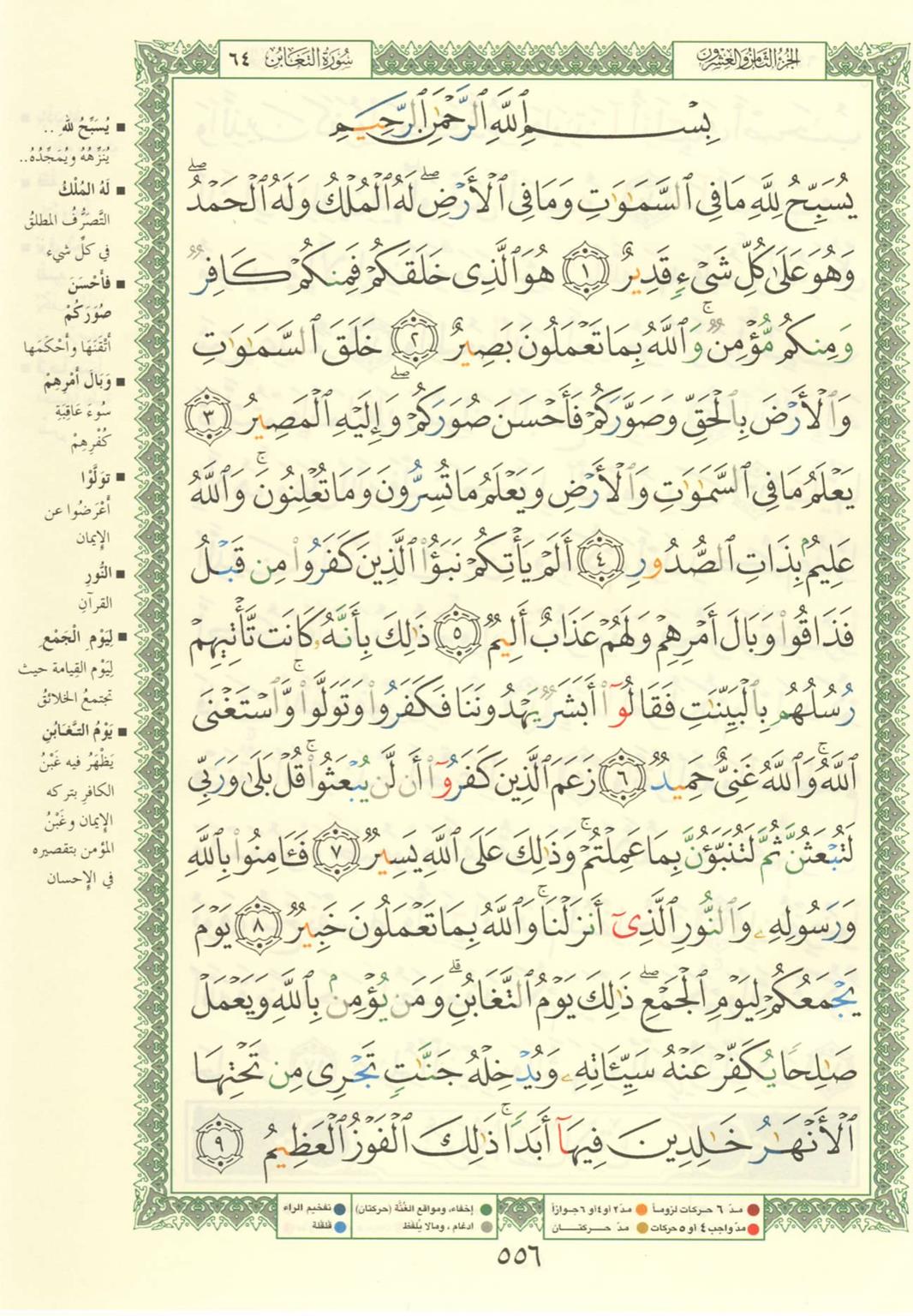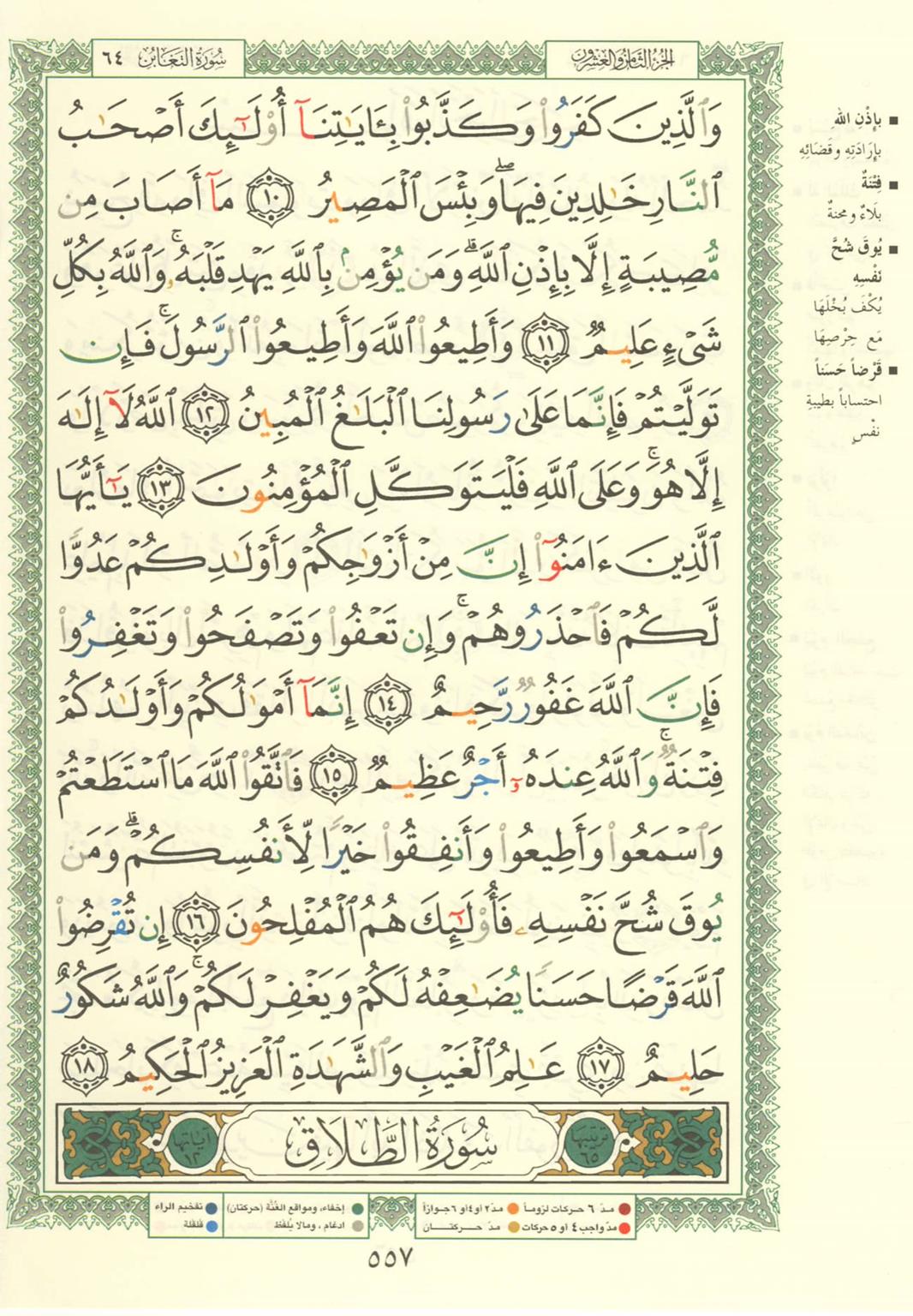Surah Taghabun
Contents


Page 556
64:1
س-ب-ح
![]() يُسَبِّحُ
یُسَبِّحُ
yusabbiḥu
Glorifies
يُسَبِّحُ
یُسَبِّحُ
yusabbiḥu
Glorifies
ا-ل-ه
![]() لِلَّهِ
لِلّٰهِ
lillahi
[to] Allah
لِلَّهِ
لِلّٰهِ
lillahi
[to] Allah
م-ا
![]() مَا
مَا
mā
whatever
مَا
مَا
mā
whatever
ف-ي
![]() فِي
فِی
fī
(is) in
فِي
فِی
fī
(is) in
س-م-و
![]() ٱلسَّمَٰوَٰتِ
السَّمٰوٰتِ
s-samāwāti
the heavens
ٱلسَّمَٰوَٰتِ
السَّمٰوٰتِ
s-samāwāti
the heavens
م-ا
![]() وَمَا
وَمَا
wamā
and whatever
وَمَا
وَمَا
wamā
and whatever
ف-ي
![]() فِي
فِی
fī
(is) in
فِي
فِی
fī
(is) in
ا-ر-ض
![]() ٱلۡأَرۡضِۖ
الْاَرْضِ ۚ—
l-arḍi
the earth.
ٱلۡأَرۡضِۖ
الْاَرْضِ ۚ—
l-arḍi
the earth.
ل
![]() لَهُ
لَهُ
lahu
For Him
لَهُ
لَهُ
lahu
For Him
م-ل-ك
![]() ٱلۡمُلۡكُ
الْمُلْكُ
l-mul'ku
(is the) dominion
ٱلۡمُلۡكُ
الْمُلْكُ
l-mul'ku
(is the) dominion
ل
![]() وَلَهُ
وَلَهُ
walahu
and for Him
وَلَهُ
وَلَهُ
walahu
and for Him
ح-م-د
![]() ٱلۡحَمۡدُۖ
الْحَمْدُ ؗ—
l-ḥamdu
(is) the praise.
ٱلۡحَمۡدُۖ
الْحَمْدُ ؗ—
l-ḥamdu
(is) the praise.
ه-و
![]() وَهُوَ
وَهُوَ
wahuwa
And He
وَهُوَ
وَهُوَ
wahuwa
And He
ع-ل-ي
![]() عَلَىٰ
عَلٰی
ʿalā
(is) on
عَلَىٰ
عَلٰی
ʿalā
(is) on
ك-ل-ل
![]() كُلِّ
كُلِّ
kulli
every
كُلِّ
كُلِّ
kulli
every
ش-ي-ا
![]() شَيۡءٖ
شَیْءٍ
shayin
thing
شَيۡءٖ
شَیْءٍ
shayin
thing
ق-د-ر
![]() قَدِيرٌ
قَدِیْرٌ
qadīrun
All-Powerful.
قَدِيرٌ
قَدِیْرٌ
qadīrun
All-Powerful.
64:2
ه-و
![]() هُوَ
هُوَ
huwa
He
هُوَ
هُوَ
huwa
He
ا-ل-ل-ذ
![]() ٱلَّذِي
الَّذِیْ
alladhī
(is) the One Who
ٱلَّذِي
الَّذِیْ
alladhī
(is) the One Who
خ-ل-ق
![]() خَلَقَكُمۡ
خَلَقَكُمْ
khalaqakum
created you
خَلَقَكُمۡ
خَلَقَكُمْ
khalaqakum
created you
م-ن
![]() فَمِنكُمۡ
فَمِنْكُمْ
faminkum
and among you
فَمِنكُمۡ
فَمِنْكُمْ
faminkum
and among you
ك-ف-ر
![]() كَافِرٞ
كَافِرٌ
kāfirun
(is) a disbeliever
كَافِرٞ
كَافِرٌ
kāfirun
(is) a disbeliever
م-ن
![]() وَمِنكُم
وَّمِنْكُمْ
waminkum
and among you
وَمِنكُم
وَّمِنْكُمْ
waminkum
and among you
ا-م-ن
![]() مُّؤۡمِنٞۚ
مُّؤْمِنٌ ؕ—
mu'minun
(is) a believer.
مُّؤۡمِنٞۚ
مُّؤْمِنٌ ؕ—
mu'minun
(is) a believer.
ا-ل-ه
![]() وَٱللَّهُ
وَاللّٰهُ
wal-lahu
And Allah
وَٱللَّهُ
وَاللّٰهُ
wal-lahu
And Allah
ب-م-ا
![]() بِمَا
بِمَا
bimā
of what
بِمَا
بِمَا
bimā
of what
ع-م-ل
![]() تَعۡمَلُونَ
تَعْمَلُوْنَ
taʿmalūna
you do
تَعۡمَلُونَ
تَعْمَلُوْنَ
taʿmalūna
you do
ب-ص-ر
![]() بَصِيرٌ
بَصِیْرٌ
baṣīrun
(is) All-Seer.
بَصِيرٌ
بَصِیْرٌ
baṣīrun
(is) All-Seer.
64:3
خ-ل-ق
![]() خَلَقَ
خَلَقَ
khalaqa
He created
خَلَقَ
خَلَقَ
khalaqa
He created
س-م-و
![]() ٱلسَّمَٰوَٰتِ
السَّمٰوٰتِ
s-samāwāti
the heavens
ٱلسَّمَٰوَٰتِ
السَّمٰوٰتِ
s-samāwāti
the heavens
ا-ر-ض
![]() وَٱلۡأَرۡضَ
وَالْاَرْضَ
wal-arḍa
and the earth
وَٱلۡأَرۡضَ
وَالْاَرْضَ
wal-arḍa
and the earth
ح-ق-ق
![]() بِٱلۡحَقِّ
بِالْحَقِّ
bil-ḥaqi
with truth,
بِٱلۡحَقِّ
بِالْحَقِّ
bil-ḥaqi
with truth,
ص-و-ر
![]() وَصَوَّرَكُمۡ
وَصَوَّرَكُمْ
waṣawwarakum
and He formed you
وَصَوَّرَكُمۡ
وَصَوَّرَكُمْ
waṣawwarakum
and He formed you
ح-س-ن
![]() فَأَحۡسَنَ
فَاَحْسَنَ
fa-aḥsana
and made good
فَأَحۡسَنَ
فَاَحْسَنَ
fa-aḥsana
and made good
ص-و-ر
![]() صُوَرَكُمۡۖ
صُوَرَكُمْ ۚ—
ṣuwarakum
your forms,
صُوَرَكُمۡۖ
صُوَرَكُمْ ۚ—
ṣuwarakum
your forms,
ا-ل-ي
![]() وَإِلَيۡهِ
وَاِلَیْهِ
wa-ilayhi
and to Him
وَإِلَيۡهِ
وَاِلَیْهِ
wa-ilayhi
and to Him
ص-ي-ر
![]() ٱلۡمَصِيرُ
الْمَصِیْرُ
l-maṣīru
(is) the final return.
ٱلۡمَصِيرُ
الْمَصِیْرُ
l-maṣīru
(is) the final return.
64:4
ع-ل-م
![]() يَعۡلَمُ
یَعْلَمُ
yaʿlamu
He knows
يَعۡلَمُ
یَعْلَمُ
yaʿlamu
He knows
م-ا
![]() مَا
مَا
mā
what
مَا
مَا
mā
what
ف-ي
![]() فِي
فِی
fī
(is) in
فِي
فِی
fī
(is) in
س-م-و
![]() ٱلسَّمَٰوَٰتِ
السَّمٰوٰتِ
s-samāwāti
the heavens
ٱلسَّمَٰوَٰتِ
السَّمٰوٰتِ
s-samāwāti
the heavens
ا-ر-ض
![]() وَٱلۡأَرۡضِ
وَالْاَرْضِ
wal-arḍi
and the earth,
وَٱلۡأَرۡضِ
وَالْاَرْضِ
wal-arḍi
and the earth,
ع-ل-م
![]() وَيَعۡلَمُ
وَیَعْلَمُ
wayaʿlamu
and He knows
وَيَعۡلَمُ
وَیَعْلَمُ
wayaʿlamu
and He knows
م-ا
![]() مَا
مَا
mā
what
مَا
مَا
mā
what
س-ر-ر
![]() تُسِرُّونَ
تُسِرُّوْنَ
tusirrūna
you conceal
تُسِرُّونَ
تُسِرُّوْنَ
tusirrūna
you conceal
م-ا
![]() وَمَا
وَمَا
wamā
and what
وَمَا
وَمَا
wamā
and what
ع-ل-ن
![]() تُعۡلِنُونَۚ
تُعْلِنُوْنَ ؕ—
tuʿ'linūna
you declare.
تُعۡلِنُونَۚ
تُعْلِنُوْنَ ؕ—
tuʿ'linūna
you declare.
ا-ل-ه
![]() وَٱللَّهُ
وَاللّٰهُ
wal-lahu
And Allah
وَٱللَّهُ
وَاللّٰهُ
wal-lahu
And Allah
ع-ل-م
![]() عَلِيمُۢ
عَلِیْمٌۢ
ʿalīmun
(is) All-Knowing
عَلِيمُۢ
عَلِیْمٌۢ
ʿalīmun
(is) All-Knowing
ذ-و
![]() بِذَاتِ
بِذَاتِ
bidhāti
of what
بِذَاتِ
بِذَاتِ
bidhāti
of what
ص-د-ر
![]() ٱلصُّدُورِ
الصُّدُوْرِ
ṣ-ṣudūri
(is in) the breasts.
ٱلصُّدُورِ
الصُّدُوْرِ
ṣ-ṣudūri
(is in) the breasts.
64:5
ل-م
![]() أَلَمۡ
اَلَمْ
alam
Has not
أَلَمۡ
اَلَمْ
alam
Has not
ا-ت-ي
![]() يَأۡتِكُمۡ
یَاْتِكُمْ
yatikum
come to you
يَأۡتِكُمۡ
یَاْتِكُمْ
yatikum
come to you
ن-ب-ا
![]() نَبَؤُاْ
نَبَؤُا
naba-u
(the) news
نَبَؤُاْ
نَبَؤُا
naba-u
(the) news
ا-ل-ل-ذ
![]() ٱلَّذِينَ
الَّذِیْنَ
alladhīna
(of) those who
ٱلَّذِينَ
الَّذِیْنَ
alladhīna
(of) those who
ك-ف-ر
![]() كَفَرُواْ
كَفَرُوْا
kafarū
disbelieved
كَفَرُواْ
كَفَرُوْا
kafarū
disbelieved
م-ن
![]() مِن
مِنْ
min
before?
مِن
مِنْ
min
before?
ق-ب-ل
![]() قَبۡلُ
قَبْلُ ؗ—
qablu
before?
قَبۡلُ
قَبْلُ ؗ—
qablu
before?
ذ-و-ق
![]() فَذَاقُواْ
فَذَاقُوْا
fadhāqū
So they tasted
فَذَاقُواْ
فَذَاقُوْا
fadhāqū
So they tasted
و-ب-ل
![]() وَبَالَ
وَبَالَ
wabāla
(the bad) consequence
وَبَالَ
وَبَالَ
wabāla
(the bad) consequence
ا-م-ر
![]() أَمۡرِهِمۡ
اَمْرِهِمْ
amrihim
(of) their affair,
أَمۡرِهِمۡ
اَمْرِهِمْ
amrihim
(of) their affair,
ل
![]() وَلَهُمۡ
وَلَهُمْ
walahum
and for them
وَلَهُمۡ
وَلَهُمْ
walahum
and for them
ع-ذ-ب
![]() عَذَابٌ
عَذَابٌ
ʿadhābun
(is) a punishment
عَذَابٌ
عَذَابٌ
ʿadhābun
(is) a punishment
ا-ل-م
![]() أَلِيمٞ
اَلِیْمٌ
alīmun
painful.
أَلِيمٞ
اَلِیْمٌ
alīmun
painful.
64:6
ذ-ل-ك
![]() ذَٰلِكَ
ذٰلِكَ
dhālika
That
ذَٰلِكَ
ذٰلِكَ
dhālika
That
ا-ن-ن
![]() بِأَنَّهُۥ
بِاَنَّهٗ
bi-annahu
(is) because
بِأَنَّهُۥ
بِاَنَّهٗ
bi-annahu
(is) because
ك-و-ن
![]() كَانَت
كَانَتْ
kānat
had
كَانَت
كَانَتْ
kānat
had
ا-ت-ي
![]() تَّأۡتِيهِمۡ
تَّاْتِیْهِمْ
tatīhim
come to them
تَّأۡتِيهِمۡ
تَّاْتِیْهِمْ
tatīhim
come to them
ر-س-ل
![]() رُسُلُهُم
رُسُلُهُمْ
rusuluhum
their Messengers
رُسُلُهُم
رُسُلُهُمْ
rusuluhum
their Messengers
ب-ي-ن
![]() بِٱلۡبَيِّنَٰتِ
بِالْبَیِّنٰتِ
bil-bayināti
with clear proofs,
بِٱلۡبَيِّنَٰتِ
بِالْبَیِّنٰتِ
bil-bayināti
with clear proofs,
ق-و-ل
![]() فَقَالُوٓاْ
فَقَالُوْۤا
faqālū
but they said,
فَقَالُوٓاْ
فَقَالُوْۤا
faqālū
but they said,
ب-ش-ر
![]() أَبَشَرٞ
اَبَشَرٌ
abasharun
"Shall human beings
أَبَشَرٞ
اَبَشَرٌ
abasharun
"Shall human beings
ه-د-ي
![]() يَهۡدُونَنَا
یَّهْدُوْنَنَا ؗ—
yahdūnanā
guide us?"
يَهۡدُونَنَا
یَّهْدُوْنَنَا ؗ—
yahdūnanā
guide us?"
ك-ف-ر
![]() فَكَفَرُواْ
فَكَفَرُوْا
fakafarū
So they disbelieved
فَكَفَرُواْ
فَكَفَرُوْا
fakafarū
So they disbelieved
و-ل-ي
![]() وَتَوَلَّواْۖ
وَتَوَلَّوْا
watawallaw
and turned away.
وَتَوَلَّواْۖ
وَتَوَلَّوْا
watawallaw
and turned away.
غ-ن-ي
![]() وَّٱسۡتَغۡنَى
وَّاسْتَغْنَی
wa-is'taghnā
And Allah can do without them.
وَّٱسۡتَغۡنَى
وَّاسْتَغْنَی
wa-is'taghnā
And Allah can do without them.
ا-ل-ه
![]() ٱللَّهُۚ
اللّٰهُ ؕ—
l-lahu
And Allah can do without them.
ٱللَّهُۚ
اللّٰهُ ؕ—
l-lahu
And Allah can do without them.
ا-ل-ه
![]() وَٱللَّهُ
وَاللّٰهُ
wal-lahu
And Allah
وَٱللَّهُ
وَاللّٰهُ
wal-lahu
And Allah
غ-ن-ي
![]() غَنِيٌّ
غَنِیٌّ
ghaniyyun
(is) Self-sufficient,
غَنِيٌّ
غَنِیٌّ
ghaniyyun
(is) Self-sufficient,
ح-م-د
![]() حَمِيدٞ
حَمِیْدٌ
ḥamīdun
Praiseworthy.
حَمِيدٞ
حَمِیْدٌ
ḥamīdun
Praiseworthy.
64:7
ز-ع-م
![]() زَعَمَ
زَعَمَ
zaʿama
Claim
زَعَمَ
زَعَمَ
zaʿama
Claim
ا-ل-ل-ذ
![]() ٱلَّذِينَ
الَّذِیْنَ
alladhīna
those who
ٱلَّذِينَ
الَّذِیْنَ
alladhīna
those who
ك-ف-ر
![]() كَفَرُوٓاْ
كَفَرُوْۤا
kafarū
disbelieve
كَفَرُوٓاْ
كَفَرُوْۤا
kafarū
disbelieve
ا-ن
![]() أَن
اَنْ
an
that
أَن
اَنْ
an
that
ل-ن
![]() لَّن
لَّنْ
lan
never
لَّن
لَّنْ
lan
never
ب-ع-ث
![]() يُبۡعَثُواْۚ
یُّبْعَثُوْا ؕ—
yub'ʿathū
will they be raised.
يُبۡعَثُواْۚ
یُّبْعَثُوْا ؕ—
yub'ʿathū
will they be raised.
ق-و-ل
![]() قُلۡ
قُلْ
qul
Say,
قُلۡ
قُلْ
qul
Say,
ب-ل-ي
![]() بَلَىٰ
بَلٰی
balā
"Yes,
بَلَىٰ
بَلٰی
balā
"Yes,
ر-ب-ب
![]() وَرَبِّي
وَرَبِّیْ
warabbī
by my Lord,
وَرَبِّي
وَرَبِّیْ
warabbī
by my Lord,
ب-ع-ث
![]() لَتُبۡعَثُنَّ
لَتُبْعَثُنَّ
latub'ʿathunna
surely you will be raised;
لَتُبۡعَثُنَّ
لَتُبْعَثُنَّ
latub'ʿathunna
surely you will be raised;
ث-م-م
![]() ثُمَّ
ثُمَّ
thumma
then
ثُمَّ
ثُمَّ
thumma
then
ن-ب-ا
![]() لَتُنَبَّؤُنَّ
لَتُنَبَّؤُنَّ
latunabba-unna
surely you will be informed
لَتُنَبَّؤُنَّ
لَتُنَبَّؤُنَّ
latunabba-unna
surely you will be informed
ب-م-ا
![]() بِمَا
بِمَا
bimā
of what
بِمَا
بِمَا
bimā
of what
ع-م-ل
![]() عَمِلۡتُمۡۚ
عَمِلْتُمْ ؕ—
ʿamil'tum
you did.
عَمِلۡتُمۡۚ
عَمِلْتُمْ ؕ—
ʿamil'tum
you did.
ذ-ل-ك
![]() وَذَٰلِكَ
وَذٰلِكَ
wadhālika
And that
وَذَٰلِكَ
وَذٰلِكَ
wadhālika
And that
ع-ل-ي
![]() عَلَى
عَلَی
ʿalā
for
عَلَى
عَلَی
ʿalā
for
ا-ل-ه
![]() ٱللَّهِ
اللّٰهِ
l-lahi
Allah
ٱللَّهِ
اللّٰهِ
l-lahi
Allah
ي-س-ر
![]() يَسِيرٞ
یَسِیْرٌ
yasīrun
(is) easy."
يَسِيرٞ
یَسِیْرٌ
yasīrun
(is) easy."
64:8
ا-م-ن
![]() فَـَٔامِنُواْ
فَاٰمِنُوْا
faāminū
So believe
فَـَٔامِنُواْ
فَاٰمِنُوْا
faāminū
So believe
ا-ل-ه
![]() بِٱللَّهِ
بِاللّٰهِ
bil-lahi
in Allah
بِٱللَّهِ
بِاللّٰهِ
bil-lahi
in Allah
ر-س-ل
![]() وَرَسُولِهِۦ
وَرَسُوْلِهٖ
warasūlihi
and His Messenger
وَرَسُولِهِۦ
وَرَسُوْلِهٖ
warasūlihi
and His Messenger
ن-و-ر
![]() وَٱلنُّورِ
وَالنُّوْرِ
wan-nūri
and the Light
وَٱلنُّورِ
وَالنُّوْرِ
wan-nūri
and the Light
ا-ل-ل-ذ
![]() ٱلَّذِيٓ
الَّذِیْۤ
alladhī
which
ٱلَّذِيٓ
الَّذِیْۤ
alladhī
which
ن-ز-ل
![]() أَنزَلۡنَاۚ
اَنْزَلْنَا ؕ—
anzalnā
We have sent down.
أَنزَلۡنَاۚ
اَنْزَلْنَا ؕ—
anzalnā
We have sent down.
ا-ل-ه
![]() وَٱللَّهُ
وَاللّٰهُ
wal-lahu
And Allah,
وَٱللَّهُ
وَاللّٰهُ
wal-lahu
And Allah,
ب-م-ا
![]() بِمَا
بِمَا
bimā
of what
بِمَا
بِمَا
bimā
of what
ع-م-ل
![]() تَعۡمَلُونَ
تَعْمَلُوْنَ
taʿmalūna
you do,
تَعۡمَلُونَ
تَعْمَلُوْنَ
taʿmalūna
you do,
خ-ب-ر
![]() خَبِيرٞ
خَبِیْرٌ
khabīrun
(is) All-Aware.
خَبِيرٞ
خَبِیْرٌ
khabīrun
(is) All-Aware.
64:9
ي-و-م
![]() يَوۡمَ
یَوْمَ
yawma
(The) Day
يَوۡمَ
یَوْمَ
yawma
(The) Day
ج-م-ع
![]() يَجۡمَعُكُمۡ
یَجْمَعُكُمْ
yajmaʿukum
He will assemble you
يَجۡمَعُكُمۡ
یَجْمَعُكُمْ
yajmaʿukum
He will assemble you
ي-و-م
![]() لِيَوۡمِ
لِیَوْمِ
liyawmi
for (the) Day
لِيَوۡمِ
لِیَوْمِ
liyawmi
for (the) Day
ج-م-ع
![]() ٱلۡجَمۡعِۖ
الْجَمْعِ
l-jamʿi
(of) the Assembly,
ٱلۡجَمۡعِۖ
الْجَمْعِ
l-jamʿi
(of) the Assembly,
ذ-ل-ك
![]() ذَٰلِكَ
ذٰلِكَ
dhālika
that
ذَٰلِكَ
ذٰلِكَ
dhālika
that
ي-و-م
![]() يَوۡمُ
یَوْمُ
yawmu
(will be the) Day
يَوۡمُ
یَوْمُ
yawmu
(will be the) Day
غ-ب-ن
![]() ٱلتَّغَابُنِۗ
التَّغَابُنِ ؕ—
l-taghābuni
(of) mutual loss and gain.
ٱلتَّغَابُنِۗ
التَّغَابُنِ ؕ—
l-taghābuni
(of) mutual loss and gain.
م-ن
![]() وَمَن
وَمَنْ
waman
And whoever
وَمَن
وَمَنْ
waman
And whoever
ا-م-ن
![]() يُؤۡمِنۢ
یُّؤْمِنْ
yu'min
believes
يُؤۡمِنۢ
یُّؤْمِنْ
yu'min
believes
ا-ل-ه
![]() بِٱللَّهِ
بِاللّٰهِ
bil-lahi
in Allah
بِٱللَّهِ
بِاللّٰهِ
bil-lahi
in Allah
ع-م-ل
![]() وَيَعۡمَلۡ
وَیَعْمَلْ
wayaʿmal
and does
وَيَعۡمَلۡ
وَیَعْمَلْ
wayaʿmal
and does
ص-ل-ح
![]() صَٰلِحٗا
صَالِحًا
ṣāliḥan
righteous deeds
صَٰلِحٗا
صَالِحًا
ṣāliḥan
righteous deeds
ك-ف-ر
![]() يُكَفِّرۡ
یُّكَفِّرْ
yukaffir
He will remove
يُكَفِّرۡ
یُّكَفِّرْ
yukaffir
He will remove
ع-ن
![]() عَنۡهُ
عَنْهُ
ʿanhu
from
عَنۡهُ
عَنْهُ
ʿanhu
from
س-و-ا
![]() سَيِّـَٔاتِهِۦ
سَیِّاٰتِهٖ
sayyiātihi
his evil deeds
سَيِّـَٔاتِهِۦ
سَیِّاٰتِهٖ
sayyiātihi
his evil deeds
د-خ-ل
![]() وَيُدۡخِلۡهُ
وَیُدْخِلْهُ
wayud'khil'hu
and He will admit him
وَيُدۡخِلۡهُ
وَیُدْخِلْهُ
wayud'khil'hu
and He will admit him
ج-ن-ن
![]() جَنَّٰتٖ
جَنّٰتٍ
jannātin
(to) Gardens
جَنَّٰتٖ
جَنّٰتٍ
jannātin
(to) Gardens
ج-ر-ي
![]() تَجۡرِي
تَجْرِیْ
tajrī
flow
تَجۡرِي
تَجْرِیْ
tajrī
flow
م-ن
![]() مِن
مِنْ
min
from
مِن
مِنْ
min
from
ت-ح-ت
![]() تَحۡتِهَا
تَحْتِهَا
taḥtihā
underneath it
تَحۡتِهَا
تَحْتِهَا
taḥtihā
underneath it
ن-ه-ر
![]() ٱلۡأَنۡهَٰرُ
الْاَنْهٰرُ
l-anhāru
the rivers,
ٱلۡأَنۡهَٰرُ
الْاَنْهٰرُ
l-anhāru
the rivers,
خ-ل-د
![]() خَٰلِدِينَ
خٰلِدِیْنَ
khālidīna
abiding
خَٰلِدِينَ
خٰلِدِیْنَ
khālidīna
abiding
ف-ي
![]() فِيهَآ
فِیْهَاۤ
fīhā
therein
فِيهَآ
فِیْهَاۤ
fīhā
therein
ا-ب-د
![]() أَبَدٗاۚ
اَبَدًا ؕ—
abadan
forever.
أَبَدٗاۚ
اَبَدًا ؕ—
abadan
forever.
ذ-ل-ك
![]() ذَٰلِكَ
ذٰلِكَ
dhālika
That
ذَٰلِكَ
ذٰلِكَ
dhālika
That
ف-و-ز
![]() ٱلۡفَوۡزُ
الْفَوْزُ
l-fawzu
(is) the success
ٱلۡفَوۡزُ
الْفَوْزُ
l-fawzu
(is) the success
ع-ظ-م
![]() ٱلۡعَظِيمُ
الْعَظِیْمُ
l-ʿaẓīmu
the great.
ٱلۡعَظِيمُ
الْعَظِیْمُ
l-ʿaẓīmu
the great.
64:10
ا-ل-ل-ذ
![]() وَٱلَّذِينَ
وَالَّذِیْنَ
wa-alladhīna
But those who
وَٱلَّذِينَ
وَالَّذِیْنَ
wa-alladhīna
But those who
ك-ف-ر
![]() كَفَرُواْ
كَفَرُوْا
kafarū
disbelieved
كَفَرُواْ
كَفَرُوْا
kafarū
disbelieved
ك-ذ-ب
![]() وَكَذَّبُواْ
وَكَذَّبُوْا
wakadhabū
and denied
وَكَذَّبُواْ
وَكَذَّبُوْا
wakadhabū
and denied
ا-ي-ا
![]() بِـَٔايَٰتِنَآ
بِاٰیٰتِنَاۤ
biāyātinā
[in] Our Verses,
بِـَٔايَٰتِنَآ
بِاٰیٰتِنَاۤ
biāyātinā
[in] Our Verses,
ا-و-ل-ا
![]() أُوْلَٰٓئِكَ
اُولٰٓىِٕكَ
ulāika
those
أُوْلَٰٓئِكَ
اُولٰٓىِٕكَ
ulāika
those
ص-ح-ب
![]() أَصۡحَٰبُ
اَصْحٰبُ
aṣḥābu
(are the) companions
أَصۡحَٰبُ
اَصْحٰبُ
aṣḥābu
(are the) companions
ن-و-ر
![]() ٱلنَّارِ
النَّارِ
n-nāri
(of) the Fire,
ٱلنَّارِ
النَّارِ
n-nāri
(of) the Fire,
خ-ل-د
![]() خَٰلِدِينَ
خٰلِدِیْنَ
khālidīna
abiding forever
خَٰلِدِينَ
خٰلِدِیْنَ
khālidīna
abiding forever
ف-ي
![]() فِيهَاۖ
فِیْهَا ؕ—
fīhā
therein.
فِيهَاۖ
فِیْهَا ؕ—
fīhā
therein.
ب-ا-س
![]() وَبِئۡسَ
وَبِئْسَ
wabi'sa
And wretched is
وَبِئۡسَ
وَبِئْسَ
wabi'sa
And wretched is
ص-ي-ر
![]() ٱلۡمَصِيرُ
الْمَصِیْرُ
l-maṣīru
the destination.
ٱلۡمَصِيرُ
الْمَصِیْرُ
l-maṣīru
the destination.

